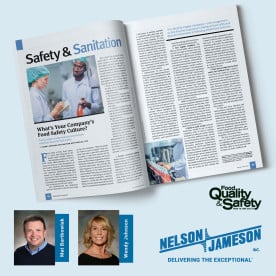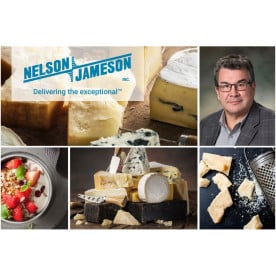For the next three months, “The Wide Line” blog will feature a series of columns authored by Dan Strongin, a well-known name in the food industry. Strongin began his career in the food industry on the front lines as a chef. For two decades he worked as a five-star chef, including seven years with the Ritz Carlton Corporation. His passion for food and excellence was then put to work as the corporate chef and director of delicatessen operations for Andronico’s Markets, San Francisco. From 1995 to 1996 he served as the president of the American Cheese Society. He then became a managing partner and owner of Edible Solutions, a consulting company, and currently is a columnist for the Cheese Reporter. As a mentor for companies through Deming Collaboration, Strongin focuses on working with companies on effective management, strategic planning and marketing, and production systems. We have no doubt that Strongin’s insights will be of special interest to a wide variety of NJ customers navigating the realities of the food industry and market today...

Having had the advantage, in my line of work, of visiting with and learning the intimate details of hundreds of businesses, many of them in food, and dairy, I’ve become pretty familiar with what one can expect to see when you visit a plant. You’ll see doors; protective clothing; machines; florescent lights; a bulletin board with OSHA and other “required” postings; mostly concrete floors with an epoxy coating; and a thick, heavy and colorful book that over time I began to recognize as the Nelson-Jameson catalog.
With a hectic schedule, I was always aware of its presence in many operations, but never quite got a chance to look into what it was all about. Even after discovering that one of my clients, with whom I have been working for the last 5 years in a very successful transformation, (mostly due to their hard work, dedication and integrity), was a supplier to Nelson-Jameson, I did not put the pieces together.
It all started to formalize a bit more on November 18 of 2010. An email from Jerry Lippert of Nelson-Jameson showed up in my inbox that day. In it he had the wisdom to give me a compliment, telling me that a couple of the things I had written in my monthly column in the Cheese Reporter got his attention. In them, I had explored issues in the supply chain: inventory, and the flow of money to profit for producers: issues that he felt are central to the Nelson-Jameson value proposition, (in plain English, what they provide for their customers).
I am not immune to flattery, so we began a correspondence. In the spring of 2011, as I was traveling to a client in western Wisconsin, I stopped by Nelson-Jameson headquarters. My home base is in Rio de Janeiro, though not home as much as I would like while I travel. For those of you that don’t know, the seasons are reversed in South America. When I left my home it was 108°F, when I arrived in the airport in Minneapolis it was -40°. Practically frozen, I made my way to the rental car, and drove the three hours to Marshfield where I was given the grand tour. I was given the pleasure of meeting Mr. Lippert, Mr. Nelson, and their vice president of sales, Murray Smith, among others. I was regaled with the history and philosophy of the company.
I was informed that in 1947, Earl Nelson, his father Ted, Herb Jameson and Bob Dougherty founded Nelson-Jameson as a dairy equipment and supply business with the goal to serve as a comprehensive resource for dairy plants: a general store as it were for dairy. It was a radical idea at the time. Such things did not exist. It was an idea that had value, as they succeeded, and have grown.
Jameson and Dougherty left Nelson-Jameson to pursue other options, leaving the company in the hands of Earl and Ted. Now run by the third and fourth generation of the Nelson family, they have facilities in California, Idaho, Pennsylvania, and Texas. (I have visited the California location as well, and marveled the good sense they had to build upwards in a state where real estate per square foot can cost as much as an oil field or a goldmine, or a parking space in downtown San Francisco.)
Nelson-Jameson has expanded its markets, and its products now serve the needs of food, dairy and beverage plants — in all 50 states, as well as many foreign countries. But their core focus on being a general store for the food industry has remained firm. They warehouse the goods and ship in smaller amounts to you, so you don’t have to tie up your money in inventory, and process so many bills. This is no small matter, as my articles linked to below point out.
For example, it could be argued that a good percentage of the genius of Apple computers is not just their clever design, nor high quality production, but how they handle their supply chain to reduce standing inventory, and shorten the time money had to be invested between when an order is placed, supplies purchased and product shipped.
I’ve worked with, and had the honor of visiting a host of distribution companies over the years, and I have to tell you sincerely, Nelson-Jameson is very good at what they do.
So for the next few months, every week, I will stitch together a series of posts that will explore how working with them, and taking advantage of everything they have to offer, can help you profit in surprising and substantial ways. In the process feel free to comment and ask questions with each post.
The links to those articles are: http://bit.ly/MGyGhI and http://bit.ly/N3huDs. They were part of a series on how to stem hidden losses, and regain lost profit opportunities.





